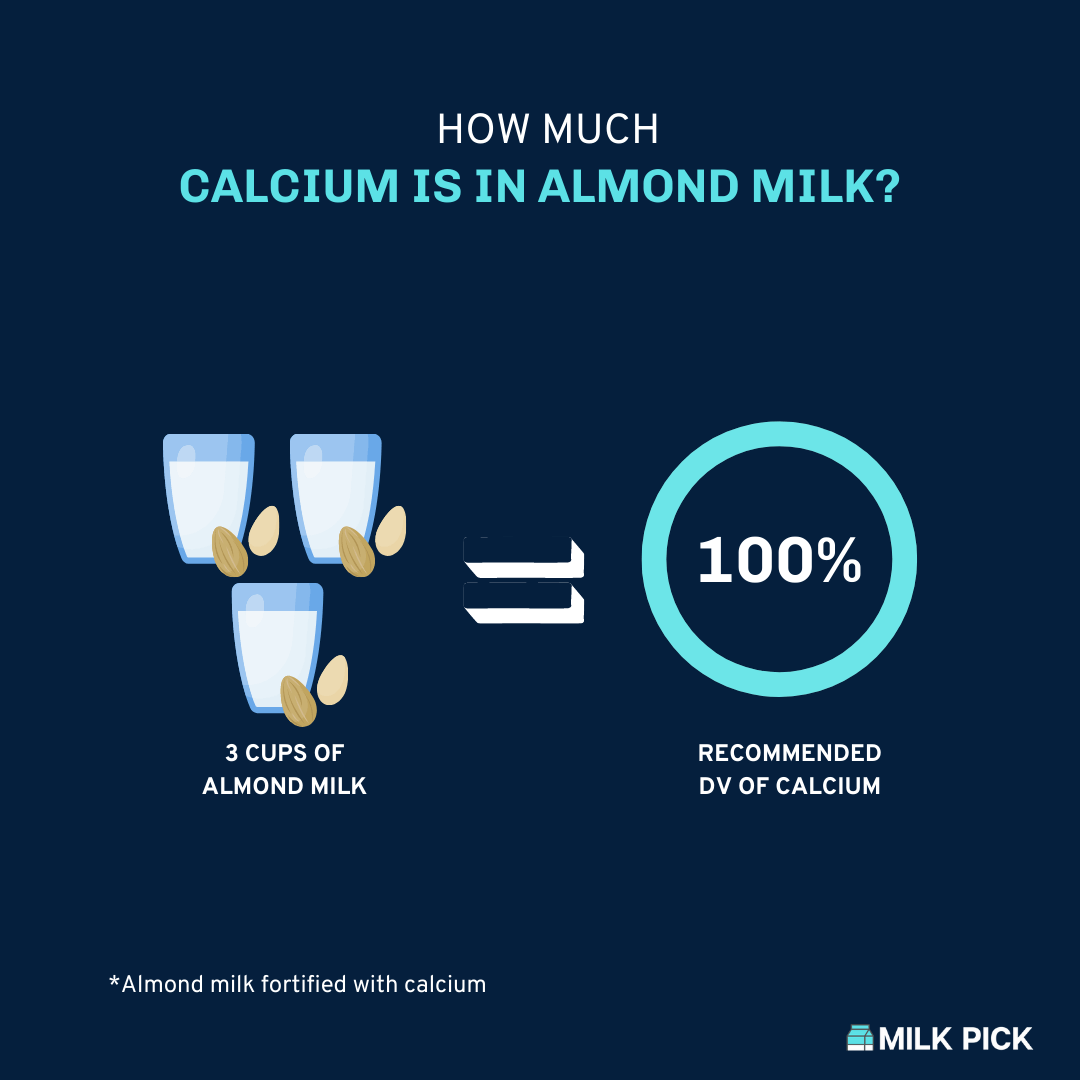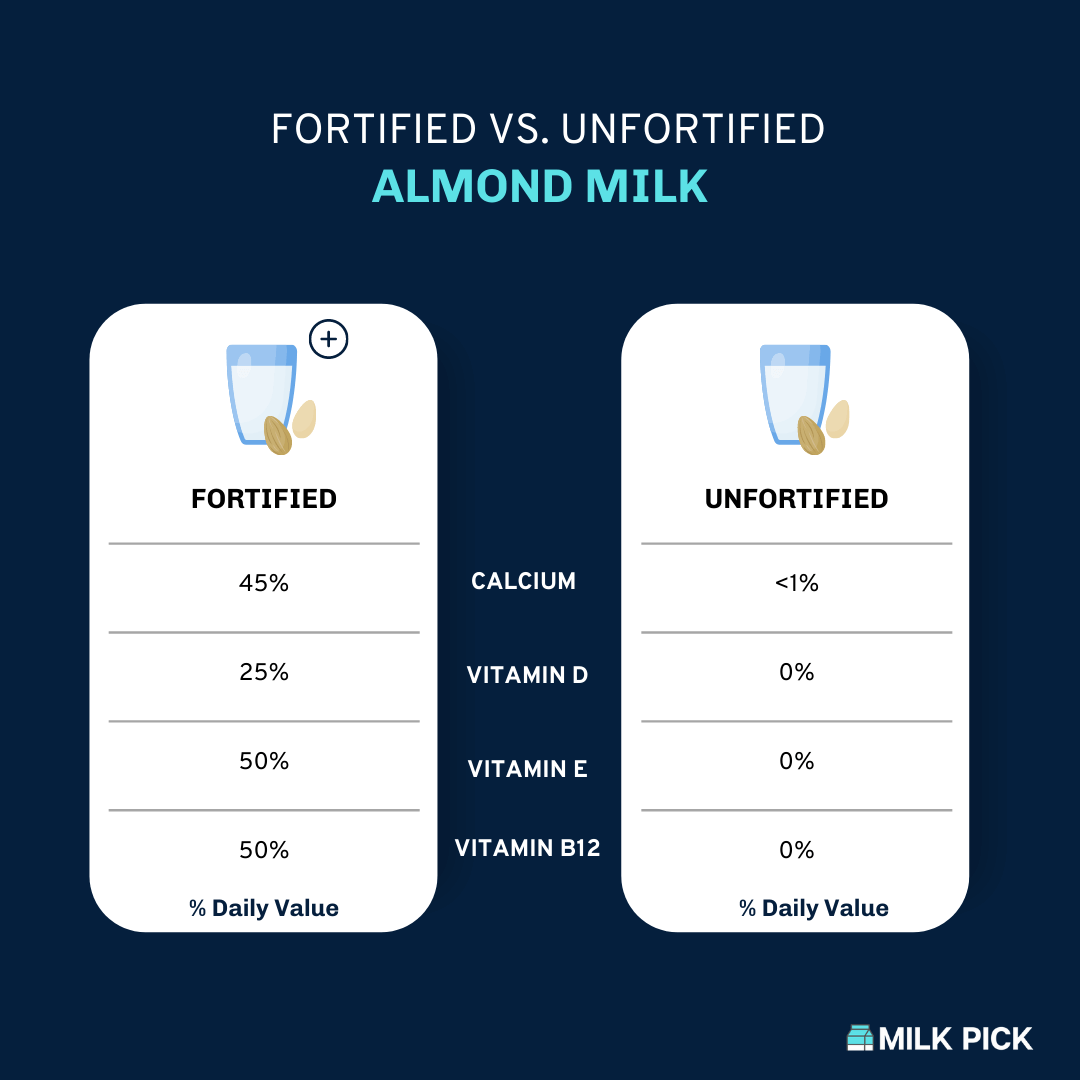Strong bones are essential for preventing injuries and promoting your ability to move throughout your lifespan. With traditional cow milk touted as a bone-healthy option, you might wonder if almond milk is good for your bones.
Almond milk fortified with calcium and vitamin D is an excellent choice for building and maintaining healthy bones. Calcium and vitamin D help to build strong bones, while the high levels of vitamin E help to minimize the effects of stressors in your body that try to break down your bones.
This article will give you an in-depth understanding of how almond milk affects your bone health.
We’ll also dive into what nutrients you need to look for in your almond milk to build healthy bones.
Why is Almond Milk Good for Your Bones?
Almond milk fortified with vitamin D and calcium helps maintain healthy bones by providing your bones with the building blocks they need to stay strong.
It’s also packed with vitamin E, an antioxidant to block free radicals that try to break down your bones.
Calcium and vitamin D work together as a team to help build your bone back up after it undergoes the micro-stressors associated with day-to-day living.
Assuring that you are consuming enough of these two nutrients has been shown to help maintain healthy bone density even as you age.
The vitamin E found in almond milk has been shown to reduce the number of free radicals in your body because it is an antioxidant.
Free radicals result in stress to your bone that can reduce the overall density, so you want to have as few of them in your body as possible.
With all these nutrients present in a glass of almond milk fortified with vitamin D and calcium, it’s clear that almond milk is a good choice for your bones.
Why Should You Care About Bone Health?
While it’s nice to know that almond milk will help your bones, why should you care about your bone health in the first place?
Without healthy bones, you are at a high risk for developing osteoporosis.
Osteoporosis is a condition where your bones are weak and brittle, placing you at risk for fractures.
Anyone who has experienced a fracture will tell you it’s no fun. And when you have a fracture anywhere in your body, you can’t move or live life on your terms.
If that doesn’t convince you of the importance of your bone health, you might be interested to know that having healthy bones could be the difference between life and death as you age.
Research has found that in older adults who sustain a hip fracture, both quality of life and lifespan are reduced.
Needless to say, the choices you make now to take care of your bones can significantly impact your health in the future.
Cow Milk vs. Almond Milk For Bone Health
Now that you understand why you need to take your bone health seriously, you might wonder if cow or almond milk is better for your bones.
The first thing to consider is the amount of calcium and vitamin D in each type of milk.
A glass of 1% fat cow milk contains 305 milligrams of calcium. When fortified with vitamin D has 15-20% of your recommended daily value.
A glass of fortified almond milk contains approximately 428 milligrams of calcium and 20-25% of your recommended daily value of vitamin D.
Fortified almond milk tends to contain more calcium, making it a slightly better option than cow milk for your bones.
And because both options of milk have to be fortified with vitamin D and contain relatively similar amounts, there is no clear winner in that regard.
If you opt for cow milk, make sure you choose a version fortified with vitamin D to optimize calcium absorption.
How Much Calcium Do You Need for Strong Bones?
Most of us know that calcium is one of the primary nutrients needed to build healthy bones, but how much of it do you need?
It's recommended that you consume 1,200 milligrams of calcium per day to maintain healthy bones.
Recall that one eight-ounce glass of fortified almond milk contains about 428 milligrams of calcium.
This means consuming about three glasses of almond milk would get you where you need to be.
You can easily achieve this by using almond milk with one of the following:
- Cereal
- Smoothies
- Adding it to coffee or tea
- Baking with almond milk
If you are also supplementing with a multivitamin, check the label so you can calculate your own individual calcium needs and modify how much almond milk you consume accordingly.

The Relationship Between Vitamin D and Bone Health
The next important nutrient to consider when it comes to keeping your bones healthy is vitamin D.
Vitamin D is just as crucial as calcium because, without vitamin D, your body can’t use the calcium to build healthy bones.
Vitamin D is the key that unlocks the door for calcium to get into the bone.
Without the key, it doesn’t matter how much calcium you have available because it can’t get through the door.
We can produce some vitamin D naturally by spending time in the sun.
However, most of us don’t spend enough time outside or live in regions where we can’t get sufficient sun exposure.
This is why it’s important that your almond milk is fortified with both calcium and vitamin D.
Without those ingredients, you’re wasting your time drinking it when it comes to your bone health.
Does Almond Milk Need to Be Fortified with Vitamin D and Calcium?
The short and simple answer is yes. Almond milk that is not fortified with calcium and vitamin D does not contain these nutrients in sufficient amounts to help your bones.
An eight-ounce cup of almond milk that is not fortified has the following amounts:
- Calcium: 2 milligrams
- Vitamin D: 0 milligrams
To use almond milk to improve your bone health, you need to go with a fortified version.
While non-fortified versions of almond milk may not be the best for your bones, there are still many other health benefits worth considering when choosing a milk that is right for you.

The Relationship Between Vitamin E and Your Bones
Vitamin D and calcium get all the airtime when it comes to bone health, but there is another vitamin that promotes your bone health—Vitamin E.
Vitamin E is a well-known antioxidant that helps neutralize free radicals in your body. Free radicals are essentially chemicals in your body that harm the cells in your body.
These free radicals can begin to de-mineralize your bones and negatively impact your bone health.
Luckily, research has found that vitamin E minimizes these free radicals and preserves your bones' integrity in the process.
Vitamin E and Almond Milk
What do vitamin E and your bone health have to do with almond milk? Well, almond milk just so happens to be naturally rich in vitamin E.
The average eight-ounce cup of almond milk contains 46-50% of the recommended daily value of vitamin E.
By drinking or cooking with a few glasses of almond milk, you can be assured that you have sufficient vitamin E to stave off free radicals that could be working to break down your bones.
And if you’re drinking almond milk fortified with calcium and vitamin D, you now benefit from all three nutrients for your bones.
Almond Milk is Good For Your Bones (If It's Fortified)
If you want to keep your bones strong and healthy, almond milk fortified with vitamin D and calcium is a good choice.
The amount of vitamin D and calcium found in fortified almond milk alongside the naturally occurring vitamin E helps maintain your bones' integrity throughout your lifespan.
When buying almond milk from the store, choose a variation fortified with vitamin D and calcium to optimize your bone health.
If you are trying to decide between almond and traditional cow milk, there is no clear winner regarding your bone health. Both options must be fortified with vitamin D to help your bones and have similar amounts of the necessary nutrients.
However, it may be worth considering the other health benefits of almond milk when choosing between traditional and cow milk.
At the end of the day, you can make dietary choices today that impact your bone health for years to come.
Opting to use fortified almond milk is a choice that sets you and your bones up for a healthy, fracture-free future!
